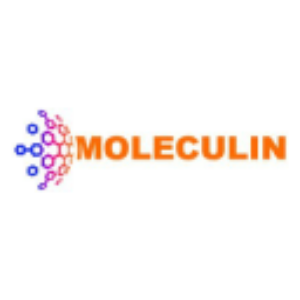Moleculin Announces New Pre-Clinical Data for Annamycin Demonstrating Market Expansion Potential Including Treatment for Pancreatic Cancer
Rhea-AI Summary
Moleculin Biotech presented new pre-clinical data for their cancer drug Annamycin at the AACR Annual Meeting 2025 in Chicago. The research shows Annamycin's potential to treat multiple cancer types, including pancreatic cancer.
Key findings demonstrate that Annamycin can work synergistically with various FDA-approved anticancer drugs both in laboratory tests (in vitro) and in living organisms (in vivo). The drug showed promising results against resistant cell lines, including those resistant to cytarabine and venetoclax.
The study explored Annamycin's effectiveness in combination with approved cancer treatments, focusing on leukemia, sarcoma, and pancreatic cancer models. CEO Walter Klemp highlighted this as a significant market expansion opportunity, particularly valuable for combination therapy approaches in cancer treatment.
The research was presented by Dr. Waldemar Priebe from MD Anderson Cancer Center, focusing on Annamycin's combination potential with drugs like azacitidine, cytarabine, gemcitabine, ifosfamide, trabectedin, and vincristine.
Positive
- New pre-clinical data shows Annamycin's potential market expansion into pancreatic cancer treatment
- Demonstrated synergistic results when combined with multiple FDA-approved drugs, increasing potential market applications
- Five previous/current investigator-initiated clinical trials supporting drug development
- Drug shows activity against resistant cell lines, including those resistant to cytarabine and venetoclax
- Potential expansion into multiple cancer markets: hematological malignancies, sarcoma, and pancreatic cancer
Negative
- Still in pre-clinical stage for pancreatic cancer indication
- Requires additional clinical trials to validate market expansion potential
- No concrete timeline provided for pancreatic cancer or soft tissue sarcoma trials
Insights
Annamycin shows promising synergy with multiple FDA-approved drugs against resistant cancers, expanding potential applications beyond hematological malignancies to solid tumors.
The preclinical data presented by Moleculin on Annamycin demonstrates significant therapeutic versatility through synergistic interactions with multiple FDA-approved anticancer therapies. The research methodically progressed from in vitro (laboratory) studies to in vivo (animal model) validation, showing efficacy in both blood cancers and challenging solid tumors like sarcoma and pancreatic cancer.
What's particularly notable is Annamycin's activity against drug-resistant cell lines, including those resistant to cytarabine and venetoclax - a common clinical challenge in treating aggressive cancers. As a next-generation anthracycline that functions as a Topo II poison, Annamycin appears capable of enhancing the efficacy of mechanistically diverse cancer treatments.
The expansion into pancreatic cancer research is especially significant given this disease's dismal
While these findings are promising, it's important to recognize they remain at the preclinical stage. The translation of combination therapy benefits from laboratory and animal models to human patients requires rigorous clinical validation. Nevertheless, this research establishes a strong scientific rationale for further investigating Annamycin's potential in multiple cancer types with significant unmet needs.
Moleculin's Annamycin shows expanded market potential through synergistic combinations; enhances partnership appeal and creates multiple paths to commercialization.
Moleculin's latest research strategically positions Annamycin for potential market expansion beyond its initial indications. By demonstrating synergy with established FDA-approved therapies, the company is building a compelling case for Annamycin as a versatile combination agent across multiple cancer types.
CEO Walter Klemp's statement that these findings may make Annamycin "more attractive to prospective future partners" signals the company's partnership strategy, which could provide validation and potentially non-dilutive funding - crucial considerations for smaller biotechs. The mention of five investigator-initiated trials highlights academic and clinical interest in Moleculin's pipeline, enabling cost-effective data generation.
The expansion into pancreatic cancer and sarcoma markets represents a significant opportunity, as both indications face limited treatment options and substantial unmet needs. Pancreatic cancer, with its dismal survival rates, represents a multi-billion-dollar market opportunity with limited competition in effective therapies.
For investors, this multi-indication strategy creates several potential paths to market, reducing overall development risk. The synergistic combination approach with already-approved drugs could also streamline clinical development by leveraging established treatment protocols and potentially enabling accelerated approval pathways.
While these preclinical findings require clinical validation, they enhance Annamycin's overall value proposition and potential market reach, strengthening Moleculin's position in negotiations with potential future development and commercialization partners.
Data presented at the American Association for Cancer Research (AACR) Annual Meeting 2025
Annamycin is potentially a highly versatile drug capable of working synergistically with numerous mechanistically different FDA approved anticancer first line therapies both in vitro and in vivo
HOUSTON, April 29, 2025 (GLOBE NEWSWIRE) -- Moleculin Biotech, Inc., (Nasdaq: MBRX) (“Moleculin” or the “Company”), a late-stage pharmaceutical company with a broad portfolio of drug candidates targeting hard-to-treat cancers and viral infections, today announced that an abstract and poster presentation regarding the Company’s next-generation anthracycline, Annamycin, was presented at the American Association for Cancer Research (AACR) Annual Meeting 2025, on April 28, 2025, at the McCormick Place Convention Center in Chicago, IL.
“The case for expanding the potential markets for Annamycin continues to get stronger,” said Walter Klemp, Chairman and CEO of Moleculin. “In an environment where more and more cancer treatment regimens are combinations of two or more drugs, it is encouraging to see that Annamycin appears capable of generating synergistic results with so many commonly used drugs. The latest research continues to support our view that, in addition to hematological malignancies, solid cancers including sarcoma and pancreatic cancer also represent important expansion opportunities for Annamycin. These findings may help expand the clinical use of Annamycin and consequently make our drug candidate even more attractive to prospective future partners. With five previous or current investigator-initiated clinical trials supporting development of our drug candidates, we believe that our next investigator-initiated trials could be Annamycin for the treatment of pancreatic cancer or advance soft tissue sarcomas.”
The study, presented in poster form, was designed to assess the efficacy of Annamycin in combination with approved anticancer agents in order to identify novel potentially highly efficacious clinical applications of Annamycin alone and with a therapeutic partner. Annamycin in its non-liposomal form (free drug; in vitro) and Liposomal Annamycin (L-ANN; in vivo) were tested in combination with selected US Food and Drug Administration (FDA) approved drugs. Usually, the most efficacious drug combinations from the in vitro studies were then tested using well developed in vivo models of leukemia and solid tumors, including sarcoma and pancreatic cancer.
It should be noted that in a separate set of previous experiments, Annamycin activity was tested in vitro, and appeared to be highly active, against drug resistant cell lines, including cells resistant to cytarabine and venetoclax.
The research shown in the AACR poster, described below, demonstrates that Annamycin is potentially a highly versatile drug capable of working synergistically with numerous mechanistically different FDA approved anticancer agents both in vitro and in vivo. Ongoing studies are working towards identifying new efficacious clinical applications of L-ANN drug combinations with the long-term goal of developing novel therapeutic strategies for treatment resistant cancers.
Details of the poster presentation are as follows:
Title: Combining Annamycin, a Non-cardiotoxic Potent Topo II Poison, with Azacitidine, Cytarabine, Gemcitabine, Ifosfamide, Trabectedin, or Vincristine to Synergize Anticancer Effects and Identify Potential Clinical Applications
Track: Experimental and Molecular Therapeutics
Session: PO.ET02.03. Drug Combination Strategies for Cancer Treatment
Abstract Number: 1683/ 14
Presenter: Waldemar Priebe, Ph.D., Department of Experimental Therapeutics, Division of Cancer Medicine, The University of Texas MD Anderson Cancer Center
For more information, visit the AACR Annual Meeting website.
About Moleculin Biotech, Inc.
Moleculin Biotech, Inc. is a Phase 3 clinical stage pharmaceutical company advancing a pipeline of therapeutic candidates addressing hard-to-treat tumors and viruses. The Company’s lead program, Annamycin, is a next-generation highly efficacious and well tolerated anthracycline designed to avoid multidrug resistance mechanisms and to eliminate the cardiotoxicity common with currently prescribed anthracyclines. Annamycin is currently in development for the treatment of relapsed or refractory acute myeloid leukemia (AML) and soft tissue sarcoma (STS) lung metastases.
The Company is initiating the MIRACLE (Moleculin R/R AML AnnAraC Clinical Evaluation) Trial (MB-108), a pivotal, adaptive design Phase 3 trial evaluating Annamycin in combination with cytarabine, together referred to as AnnAraC, for the treatment of relapsed or refractory acute myeloid leukemia. Following a successful Phase 1B/2 study (MB-106), with input from the FDA, the Company believes it has substantially de-risked the development pathway towards a potential approval for Annamycin for the treatment of AML. This study is subject to appropriate future filings with potential additional feedback from the FDA and their foreign equivalents.
Additionally, the Company is developing WP1066, an Immune/Transcription Modulator capable of inhibiting p-STAT3 and other oncogenic transcription factors while also stimulating a natural immune response, targeting brain tumors, pancreatic and other cancers. Moleculin is also engaged in the development of a portfolio of antimetabolites, including WP1122 for the potential treatment of pathogenic viruses, as well as certain cancer indications.
For more information about the Company, please visit www.moleculin.com and connect on X, LinkedIn and Facebook.
Forward-Looking Statements
Some of the statements in this release are forward-looking statements within the meaning of Section 27A of the Securities Act of 1933, Section 21E of the Securities Exchange Act of 1934 and the Private Securities Litigation Reform Act of 1995, which involve risks and uncertainties. Forward-looking statements in this press release include, without limitation, the ability of Annamycin to demonstrate in clinical trials the results from the animal models described in the poster. Moleculin will require significant additional financing, for which the Company has no commitments, in order to conduct its clinical trials as described in this press release, and the milestones described in this press release assume the Company’s ability to secure such financing on a timely basis. Although Moleculin believes that the expectations reflected in such forward-looking statements are reasonable as of the date made, expectations may prove to have been materially different from the results expressed or implied by such forward-looking statements. Moleculin has attempted to identify forward-looking statements by terminology including ‘believes,’ ‘estimates,’ ‘anticipates,’ ‘expects,’ ‘plans,’ ‘projects,’ ‘intends,’ ‘potential,’ ‘may,’ ‘could,’ ‘might,’ ‘will,’ ‘should,’ ‘approximately’ or other words that convey uncertainty of future events or outcomes to identify these forward-looking statements. These statements are only predictions and involve known and unknown risks, uncertainties, and other factors, including those discussed under Item 1A. “Risk Factors” in our most recently filed Form 10-K filed with the Securities and Exchange Commission (SEC) and updated from time to time in our Form 10-Q filings and in our other public filings with the SEC. Any forward-looking statements contained in this release speak only as of its date. We undertake no obligation to update any forward-looking statements contained in this release to reflect events or circumstances occurring after its date or to reflect the occurrence of unanticipated events.
Investor Contact:
JTC Team, LLC
Jenene Thomas
(908) 824-0775
MBRX@jtcir.com










